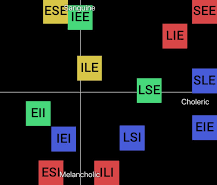



Overview
Socionics is a powerful system for understanding how people process information, engage socially, and form relationships. It is rooted in Carl Jung’s cognitive function theory and expands into 16 personality types, each defined by its unique information metabolism patterns—how the brain receives, interprets, and responds to information.
Unlike traditional personality systems, Socionics maps out intertype relations, showing how different cognitive styles interact, complement, or challenge each other in personal and professional settings. Each Socionics type represents a distinct way of thinking, feeling, and engaging with the world. By understanding your cognitive strengths and weaknesses, you can gain deeper insights into communication, decision-making, and compatibility in various aspects of life.
Socionics offers a structured framework for personal development, helping individuals:
Recognize natural cognitive tendencies and how they shape behavior.
Improve teamwork, leadership, and relationship-building skills.
Understand which types harmonize or create friction in social and romantic interactions.
Life Transitions Readings
In times of change, how we process information and make decisions greatly impacts our ability to adapt. Socionics provides a cognitive blueprint for understanding how different types approach transitions, challenges, and opportunities. Because cognitive tendencies fluctuate depending on stress, confidence, and life circumstances, Socionics helps individuals navigate shifting mental and emotional states.
For example:
Logical-Sensory Introverts (LSI - ISTj) may prefer structured plans and stability, needing clear steps and organization when facing transitions.
Intuitive-Ethical Extraverts (IEE - ENFp) may embrace spontaneity and exploration, using creativity and adaptability to navigate uncertainty.
Logical-Intuitive Introverts (ILI - INTp) tend to analyze long-term implications before taking action, sometimes delaying decisions due to overanalysis.
Rather than viewing cognitive tendencies as fixed, Socionics readings help individuals recognize how their type responds to external pressures and growth opportunities, offering strategies for adapting while remaining true to their natural strengths.
Baby and Child Readings
Socionics can help parents recognize and nurture their child's natural cognitive tendencies, ensuring that their learning environment, emotional development, and social interactions align with their inherent strengths. Since personality development occurs in phases of adaptation and reinforcement, children may exhibit different Socionics traits in response to their environment.
For example:
A child with a strong Sensory-Logical Extravert (SLE - ESTp) orientation may thrive in hands-on, high-energy environments, excelling in physical engagement and leadership roles.
A child leaning toward Intuitive-Ethical Introvert (IEI - INFp) tendencies may require space for imagination and deep reflection, excelling in philosophical and creative pursuits.
Logical-Intuitive Extravert (LIE - ENTj) children tend to seek leadership roles, preferring to organize systems and challenge ideas through debate.
Since children's cognitive functions shift with age and experiences, parents can use Socionics insights to foster flexibility, support strengths, and create environments that nurture their child's evolving personality.
Couples Synergy Readings
Socionics is particularly unique in its approach to relationships, as it identifies intertype dynamics and how different cognitive styles interact in romantic partnerships. Relationships naturally go through cycles of harmony, misalignment, and adaptation, and Socionics can help partners recognize their evolving interaction patterns.
For example:
Strengths: A Logical-Intuitive Extravert (LIE - ENTj) and an Ethical-Sensory Introvert (ESI - ISFj) may balance each other well—one focusing on visionary leadership, while the other provides emotional grounding and stability.
Challenges: A Sensory-Ethical Extravert (SEE - ESFp) and a Logical-Intuitive Introvert (ILI - INTp) may struggle with communication mismatches, as one prioritizes practical action while the other focuses on abstract analysis.
Duality Pairs (The Ideal Matches in Socionics): Some types are naturally complementary (e.g., ILE - SEI or LII - ESE), creating a relationship dynamic where each partner fulfills the other's psychological needs.
However, relationships evolve, and partners may shift their approach to communication, problem-solving, and emotional connection over time. A Socionics reading provides insights into how partners can maintain synergy, adapt to each other's growth, and resolve conflicts by leveraging their cognitive strengths.